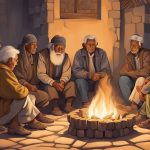Many cultures around the globe cherish a host of traditional games and recreational activities that exemplify their unique heritages. These pastimes are more than mere sports or leisurely pursuits; they are the threads weaving together the fabric of communal history, values, and identity. They offer an essential link to the past, allowing current and future generations a tangible connection to the practices and beliefs of their ancestors. As embodiments of cultural heritage, traditional games serve as living records, capturing the essence of age-old customs and collective memories.
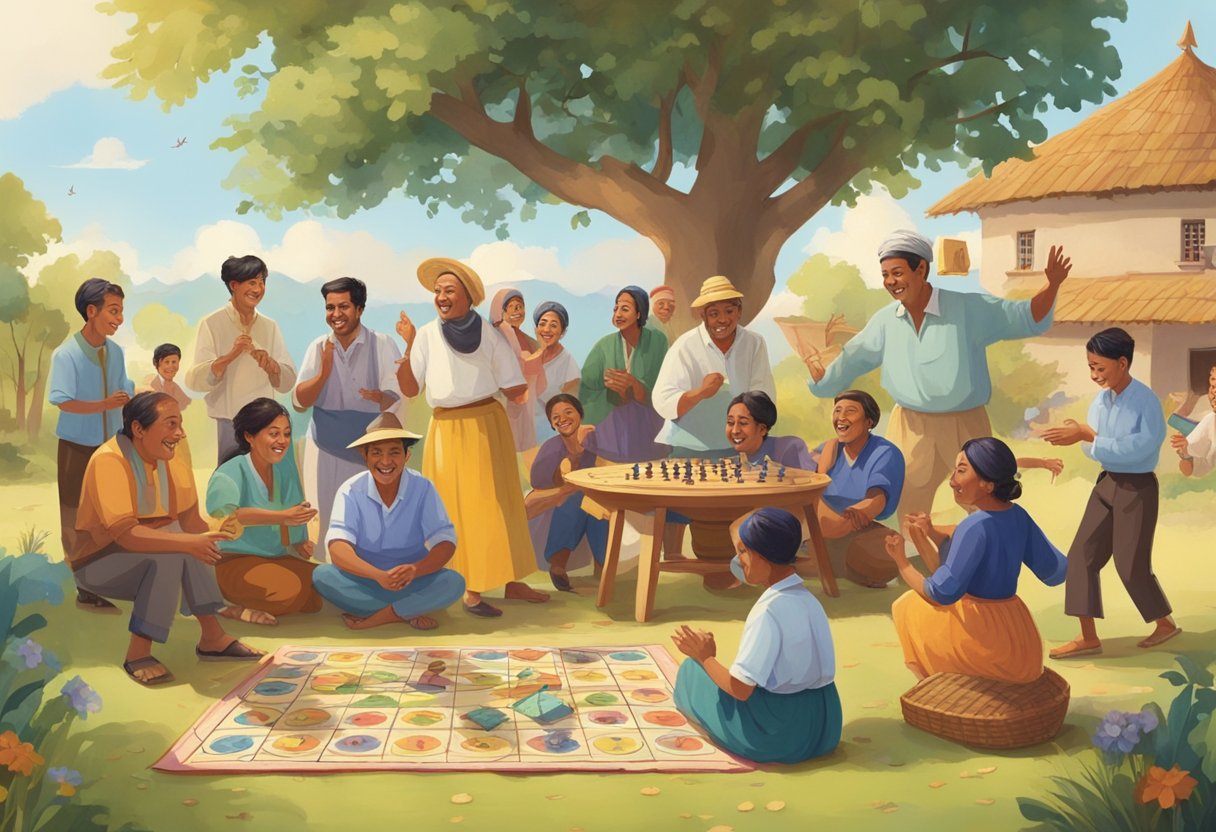
In the face of rapid globalization and technological change, the preservation of these traditional games is a testament to resilience and the enduring power of cultural expression. The practice of these activities fosters social cohesion, providing an arena in which individuals can engage with their community, learn the subtleties of teamwork, and develop respect for shared customs and rituals. The value they bring transcends physical health and mental agility; they are catalysts for social bonding and serve as a platform for intergenerational dialogue.
Addressing the need to safeguard these games is simultaneously an acknowledgment of their fragility in the modern world and a recognition of their irreplaceable role in the cultural continuum. Efforts to document, promote, and revitalize these games are crucial to forestalling the erosion of this intangible cultural heritage, ensuring that these diverse expressions of human creativity continue to enrich lives and foster a sense of belonging and identity among participants and spectators alike.
The Role and Value of Traditional Games
Traditional games serve as a vital conduit for understanding and preserving intangible cultural heritage, reflecting the diversity of communities and fostering social values.
Understanding Cultural Heritage Through Play
Through traditional games, individuals gain insights into the past, learning about the cultural contexts from which these games emerged. These games are repositories of collective memory, encapsulating the essence of historical experiences and social practices. They act as educational tools through which cultural narratives are passed down, allowing younger generations to connect with their heritage in an engaging manner. Recognizing the significance of these games is key in the safeguarding efforts of cultural traditions, ensuring they are not lost amidst progressing modernity.
Promotion of Social Values and Community Spirit
Traditional games inherently promote unity and community spirit, as they are often played in group settings where cooperation and teamwork are essential. They are platforms for social interaction, helping to forge bonds and nurture relationships within communities. These games also encourage the diversity of thought and action, as different cultures bring varied and unique approaches to play, enriching the experience for all involved. By understanding the social values embedded within these recreational activities, communities can work towards preserving not only the games themselves but the spirit of inclusivity and communal harmony they promote.
Challenges in Preserving Traditional Games
Traditional games face significant hurdles in their preservation, chiefly due to the influence of global overhauls in culture and the rapid advancement of digital technologies.
Impact of Globalization on Local Culture
Globalization has brought about a profound shift in many societies, often to the detriment of local customs and traditions. As cultures merge and the global community becomes more interlinked, there is a tendency for dominant cultures to overshadow local traditions. This has been particularly challenging for traditional games, which are deeply rooted in specific cultural contexts. The worldwide spread of mass-produced games and sports often leads to a decline in the practice of local pastimes, as they may not receive the same recognition or support.
Adversities Posed by the Digital Age
Another prominent challenge is the digital age, which has fundamentally restructured the ways in which people engage in recreational activities. Video games and digital platforms offer immersive experiences that are widely accessible and can be more appealing to younger generations than traditional games. For instance, the safeguarding of traditional games is now more critical than ever as these games compete with digital alternatives for attention and relevance. Moreover, the COVID-19 pandemic has accelerated the shift towards digital entertainment, making it even harder for traditional games, which are often played in person, to sustain their place in society’s daily life.
Support and Strategies for Preservation
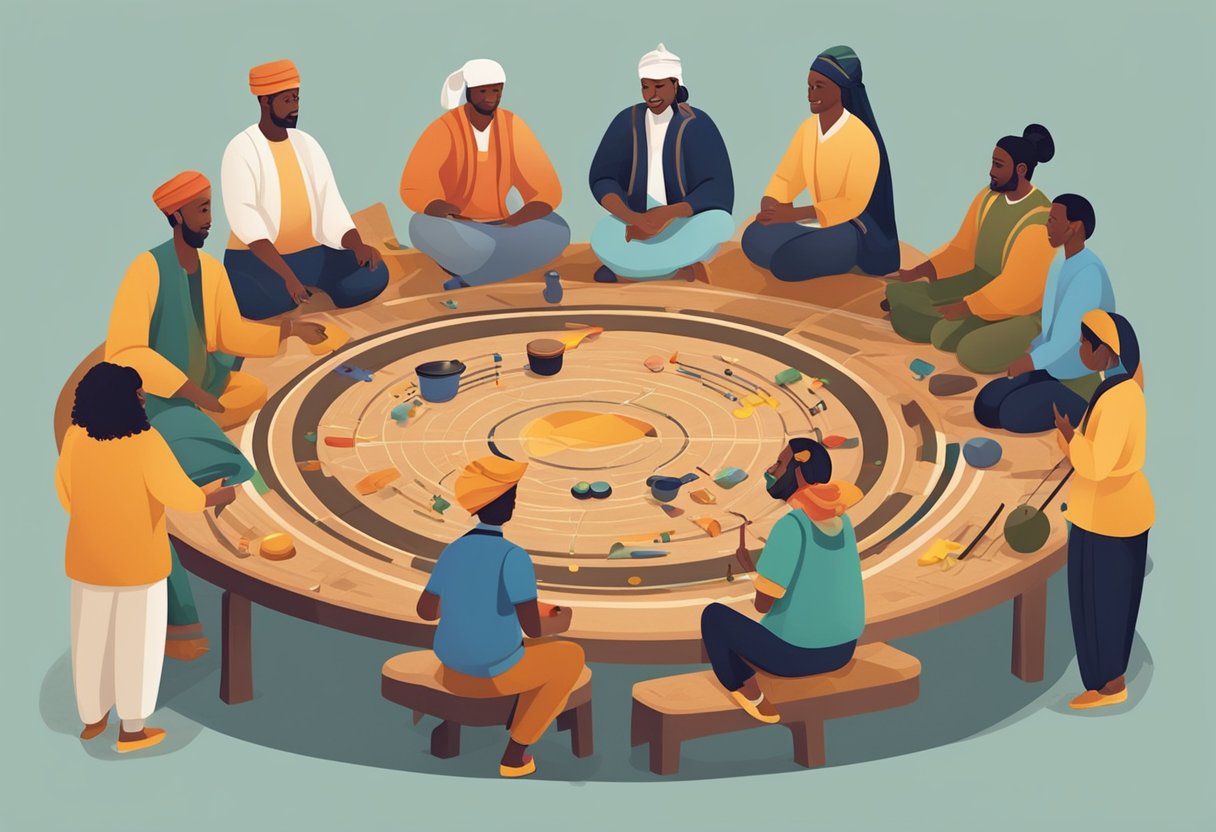
Preservation of traditional games and recreational activities involves strategic efforts by governmental bodies, international organizations, and local communities. These entities work in collaboration to keep the cultural pastimes alive for future generations.
Governmental Initiatives for Cultural Preservation
Governments play a crucial role in the preservation of traditional games by implementing policies and providing financial support. They take steps to include these cultural activities in educational programs, aiming at not only preserving them but also promoting intercultural understanding. National strategies often involve the creation of inventories and providing platforms for events that bring traditional games to the public eye.
Role of Organizations Like UNESCO and ERIA
Organizations such as UNESCO are key stakeholders in the preservation work, offering expertise and resources to support the digital archiving of traditional games. Their initiatives often involve collaboration with various governments and other entities to foster a global network. This includes efforts to adapt traditional games for the digital age, making them more accessible, which UNESCO’s actions in this domain exemplify.
Community-Based Actions and Inclusion
Local communities are the heartbeat of preserving traditional games. They uphold and pass on traditions that form the core of many cultural pastimes. Inclusion in community festivals, competitive events, and other social gatherings ensures that these activities remain relevant. Engaging young generations is especially significant, as it encourages the continuity and evolution of their cultural heritage. Community actions are often supported by government agencies and organizations like UNESCO, which promote teaching and learning through innovative ways.
Modern Integration and Innovation
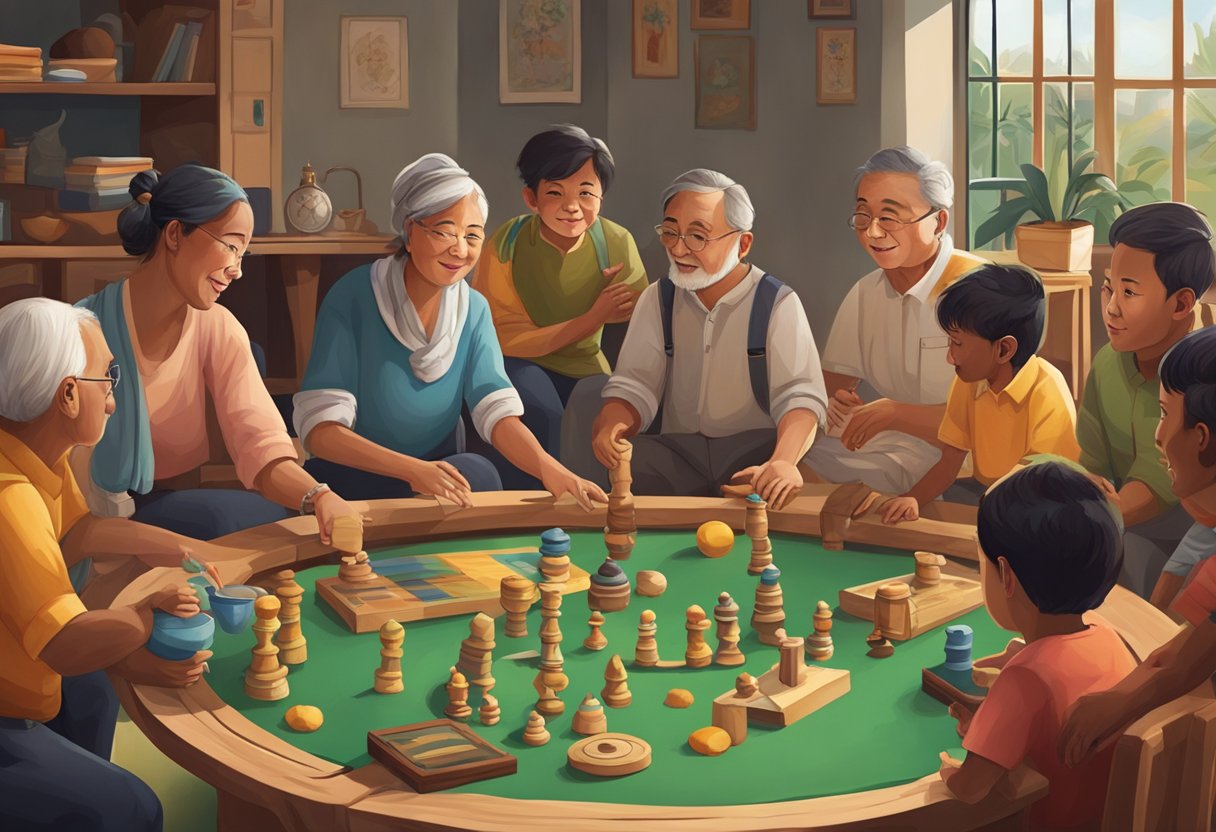
With the rise of technology, traditional games are finding new life through digital reincarnation, allowing heritage to meet the future. Game developers are exploring ways to respect the past while paving the way for new forms of play.
Adapting Traditional Games for Digital Mediums
Innovation in technology has enabled traditional games to transcend their physical boundaries. For instance, video game market giants such as Tencent have the resources and expertise to recreate traditional Mongolian games for a global audience, providing a digital platform where these games can be appreciated and played by people around the world. This adaptation not only preserves the game’s essence but also introduces historical culture to modern audiences.
By digitizing games, developers can enhance engagement through interactive features and creative design, making the experience more immersive and accessible. For example, adaptations might include elaborate visual representations of the historical context or integrating traditional rules into game mechanics.
Fostering Creativity and Design in Game Development
The design process in adapting traditional games is crucial. Developers must balance maintaining the cultural integrity of the originals with the expectations of a contemporary video game market. They apply their creativity to develop games that are both educational and entertaining, ensuring that games like the Multicolored Turtle—a game enjoyed for generations—remain relevant.
Game developers face the challenge of introducing traditional games to those unfamiliar with the cultural background, thereby fostering an environment of mutual respect and cultural exchange. Through careful design and innovative use of technology, these games can contribute to a shared understanding and tolerance among diverse communities.
Educational Context and Formal Inclusion
Traditional games have the potential to enrich educational curriculums by incorporating culturally rich physical activities. They facilitate learning through play and directly support the objectives of physical education programs, particularly within primary and secondary schools.
Integrating Traditional Sports into School Programs
Educators and policy makers from the Ministry of Education have recognized the benefits of integrating traditional sports into the school’s curriculum. This integration provides a dual benefit: it not only promotes physical activity among youth but also serves as a tool for cultural education. Programs are being structured in such a way that physical education serves as a platform for students to engage with history, society, and the diversity of cultural heritage. In doing so, these sports become more than just a means of physical activity; they become an immersive learning experience.
Enhancing Physical Activity Through Cultural Games
Cultural games are now playing a significant role in enhancing physical activity within educational settings. By offering an array of traditional games, schools can cater to diverse student interests and learning styles, which helps in maintaining high levels of engagement and motivation. The inclusion of these games in the physical education curriculum encourages students to explore the richness and variety of their cultural history through movement, promoting not only physical health but also social inclusion and understanding.
Local and Global Networks

Local and global networks play a crucial role in safeguarding traditional games and recreational activities, which are often intrinsic to cultural heritage. These networks facilitate support and collaboration essential for preserving these pastimes for future generations.
Building Support Networks for Game Preservation
Effective preservation of traditional games relies on local support networks that often include community leaders, educators, and cultural organizations. These networks are pivotal in initiating grassroots movements to document and keep alive games that otherwise might fade into obscurity. In UNESCO’s pursuit to enhance intercultural learning, they highlight the importance of governmental support as a means to protect and promote indigenous games.
Collaboration Between Indigenous Groups and Cultural Institutions
Collaboration between indigenous groups and cultural institutions is fundamental for integrating traditional games into the broader cultural narrative. Innovative projects like those explored in Beijing showcase the use of new technologies to preserve and adapt traditional games for contemporary audiences. This synergy ensures that these pastimes, forged over generations, continue to foster community and identity.
The Role of Games in Sustainable Tourism
Traditional games and sports offer a unique avenue for sustainable tourism, aligning the preservation of cultural heritage with the growing interest of travelers in authentic, local experiences.
Promoting Cultural Tourism Through Traditional Activities
Traditional games often encapsulate the essence of a culture’s history, values, and social practices. By integrating traditional sports and games into the tourism industry, destinations can provide visitors with immersive experiences that promote cultural understanding and appreciation. This approach to tourism supports sustainable development by fostering economic growth that is deeply rooted in preserving cultural identity.
For example, the Traditional Sporting Games (TSG) as Cultural Heritage are pivotal in telling the story of the Canary Islands. Through engagement in these activities, tourists can experience first-hand the living traditions that have been passed down through generations.
The Appeal of Cultural Games for International Visitors
International tourists are increasingly drawn to authentic and engaging experiences that transcend typical sightseeing. Cultural games offer an interactive way to experience a destination, appealing to visitors’ desires for unique activities and educational enrichment.
Furthermore, the conservation of traditional games can serve as an important attraction in educational tourism, as travelers seek to enrich their understanding of local cultures. Engaging in activities such as Croatia’s traditional sports, for instance, allows visitors to create a connection with the locale beyond the surface level, fostering a deeper intercultural learning and understanding as mentioned in insights from Springer.
Digital Archives and Open Access
In an era where digital technology can preserve and share cultural heritages globally, digital archives and open access platforms are pivotal. They encapsulate centuries-old pastimes and wisdom.
Creating Accessible Repositories for Games
Repositories are crucial in centralizing the storage and access of digital content related to traditional games. The creation of an open digital library on traditional games proves essential in preserving these activities in the public domain. Repositories must be user-friendly and accommodate diverse formats, ensuring that digital renditions of games, from rules to visual representations, remain accessible to all interested parties.
Use of Open Source Platforms to Share Cultural Games
Sharing cultural knowledge requires platforms that are both reliable and widely accessible. Utilizing free and open source software (FOSS), developers can create robust online environments where cultural games are documented, recreated, and discussed by users worldwide. This opens up a treasure trove of recreational activities for exploration and educational purposes, safeguarding them for future generations.
| Feature | Significance in Sharing Cultural Games |
|---|---|
| Open Access | Allows universal participation and learning. |
| Repository Integrity | Ensures original attributes of games are maintained and authenticated. |
| User Engagement | Facilitates an interactive exchange of cultural practices. |
By implementing such platforms and practices, these digital treasures can be preserved, not just as static exhibits, but as living, evolving cultural narratives.
Exhibitions and Public Events
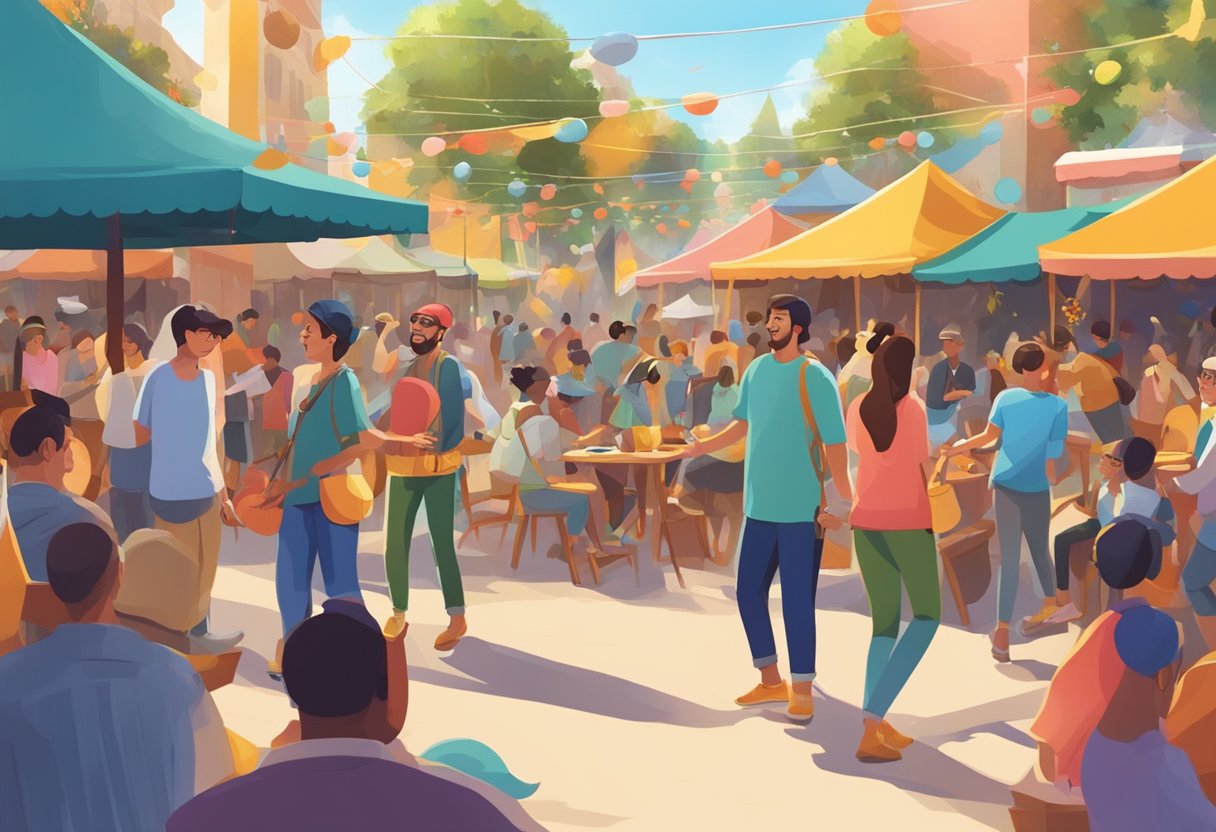
Engaging with traditional games not only honors cultural heritage but also connects communities. Exhibitions and public events offer prime opportunities for this connection.
Showcasing Traditional Games in Exhibitions
Exhibitions dedicated to traditional games serve as a platform to spotlight these protected activities. Curators create interactive exhibits where visitors can delve into cultural expressions through laid-out game stations or hands-on demonstrations. For example, an exhibition might feature games from the Philippines, allowing visitors to experience games like Sungka or Piko firsthand. These exhibitions strive to create immersive experiences that convey the history and significance of the games within their cultural context.
Organizing Public Events for Cultural Engagement
Public events, such as festivals or competitions, bring traditional games into the communal spotlight, fostering cultural engagement and education. Organizers often feature a mix of local and international games, ensuring that participants gain exposure to a broad spectrum of cultural practices. These events are announced on social platforms and local media to attract wide participation. By participating, attendees not only learn about but also help preserve these precious activities for future generations.
Organizers of these events usually ensure that the venues and activities are accessible and appealing to a diverse audience, including families and school groups, to encourage widespread involvement in the preservation of these games.
Socialization and Intercultural Communication
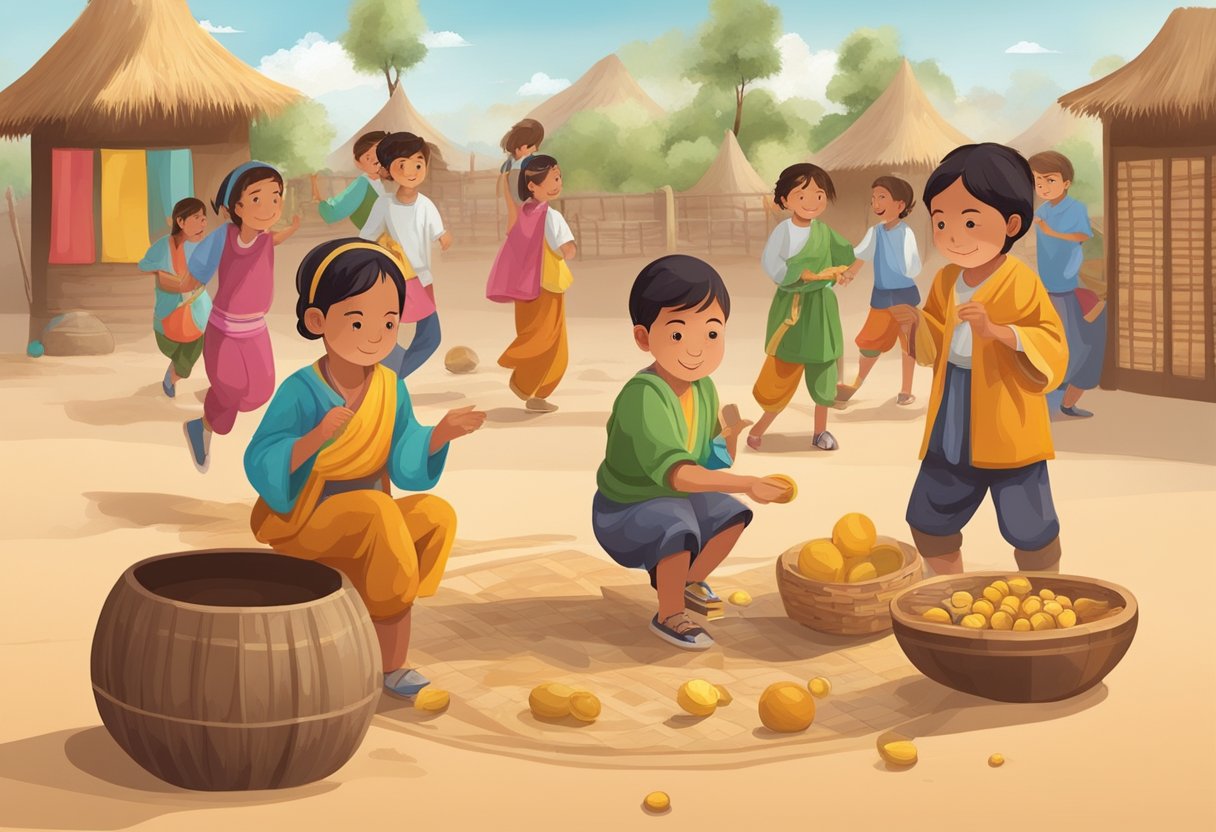
Traditional games have been instrumental in promoting socialization and fostering intercultural dialogue between diverse groups, often reflecting the peaceful and sociocultural dynamics of a community.
Games as Tools for Sociocultural Exchange
Traditional games serve as a vital conduit for sociocultural exchange, providing a platform where individuals of different backgrounds can come together and engage in shared activities. These games often carry unique cultural narratives and practices that, when shared, enhance understanding and appreciation of each other’s sociocultural context. For example, in Kabylie, traditional games act as a medium for socialization, encoding behaviors and societal roles specific to their cultural milieu, which can be crucial for intercultural learning.
Enhancing Peaceful Relations Through Traditional Sports
Traditional sports have long functioned as arenas for peaceful competition, celebrating not only physical prowess but also the intangible heritage of a group’s identity and unity. They often underscore the importance of peace and respect, qualities imperative for positive intercultural dialogue. Participation in traditional sports provides a foundation for peaceful relations by encouraging fair play and mutual respect among diverse social groups, contributing to the weaving of a harmonious societal tapestry.
Technology’s Impact on Traditional Gaming
Technology has revolutionized traditional games, enhancing accessibility and fostering global cultural exchange through online communities.
Influence of Technology on Game Accessibility
The integration of Information and Communication Technologies (ICTs) in traditional gaming has greatly increased accessibility. Traditional Filipino games, for instance, have transitioned onto digital platforms, allowing a broader audience to experience games that were once confined to physical spaces and specific regions. Online games embodying the essence of Filipino culture, like those drawing inspiration from “Piko” and “Tumbang Preso,” have become more accessible to young Filipinos and others interested in these traditional pastimes.
Online Gaming Communities and Cultural Exchange
Online gaming communities function as vehicles for cultural exchange, connecting players from different backgrounds. They particularly impact the Philippines, where communities around online games have become spaces for sharing Filipino video game culture with a global audience. These forums not only facilitate the playing of traditional games in a new medium but also enable the sharing of cultural narratives and the melding of traditions with modern gaming elements, thereby preserving culture in an ever-evolving digital landscape.
Conclusion

Traditional games serve as a living heritage, reflective of the rich cultural narratives and societal values of various communities. Throughout many member states within ASEAN and beyond, these recreational activities act as vital threads connecting the past to the present. They are not mere pastimes but repositories of communal wisdom and shared experience passed down through generations.
Individuals play a crucial role in the perpetuation of these games, embodying the rules, skills, and camaraderie these activities foster. The continued relevance of traditional games in modern society is a testament to their inherent adaptability and enduring appeal.
The private sector also has the potential to invest in the promotion and preservation of these cultural activities. By supporting initiatives that encourage active participation and appreciation, private entities can ensure that these games remain a vibrant part of our collective heritage.
In safeguarding these traditional practices, society benefits from an enriched cultural tapestry. These activities offer an alternative form of entertainment and promote physical well-being, while also anchoring communities to their history and identity.

